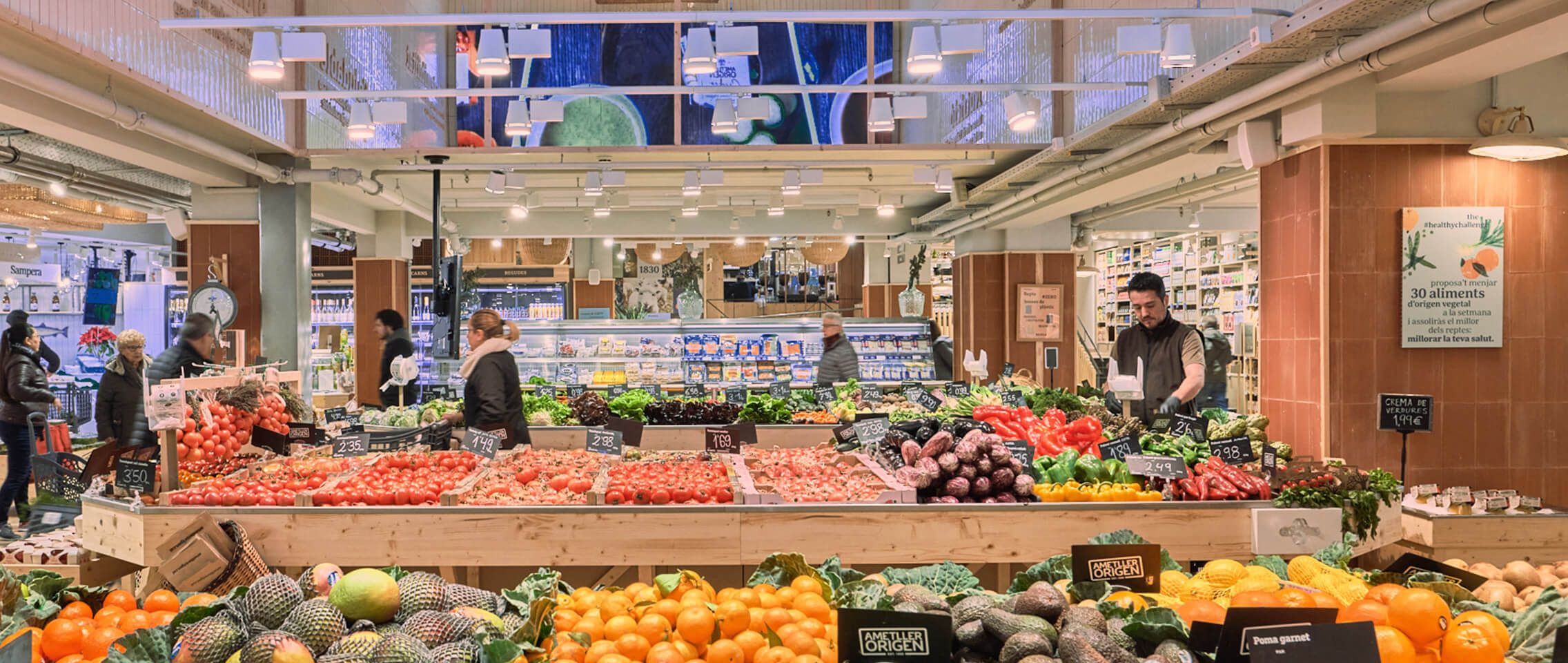The Ametller Origen Group, based in Catalonia, has become the leading regional provider of fresh food and quality processed products. Their mission is to promote a healthy and sustainable lifestyle, providing the community with access to nutritious, delicious, and clean food.
Since 1830, the Ametller family has been devoted to cultivating and caring for their farmland. In 2001, the brothers Josep and Jordi Ametller decided to launch the Ametller Origen project, starting with their first fruit and vegetable stand at the Vilafranca del Penedes market. Following the positive reception of this initial venture, they continued to set up stalls in various markets until they made the decision to open their first store.
In 2006, they established a centralized kitchen dedicated to producing a wide range of products, including yoghurts, cheeses, prepared dishes, and much more. Today, the company owns farmlands, a central kitchen, and retail stores where they market their products. This vertically integrated structure allows them to control the quality of their fruits, vegetables, and packaged products from the point of origin to their stores.
Sustainability is a key issue for Ametller Origen, and the company is making significant investments in their processes and facilities to become a climate-neutral, 100% sustainable, and circular company.
Integrating demand forecasts to enhance product availability throughout the supply chain
Following the successful implementation of the RELEX forecasting and replenishment solution in 2019, Ametller Origen has experienced remarkable improvements throughout their supply chain. Their early results drove improvements in their store replenishment, assortment planning, data quality, and communication processes, as well as overall flexibility and adaptability while maintaining sustainable double-digit growth.
By their nature, fresh and refrigerated products pose significant challenges, especially regarding waste and spoilage. Thanks to RELEX forecasts, Ametller Origen identified a pattern of vulnerability with the change of season, especially in September and January when several fresh products are introduced and removed from their assortments.
Furthermore, supply chain constraints also revealed the need for improved inventory control. Ametller Origen recognized the necessity of automating more processes throughout the supply chain to effectively continue expanding their business.
They sought a way to use their demand forecasts to align the entire supply chain and enhance their end-to-end visibility. Sharing their forecast data with their suppliers would enable greater collaboration across the supply chain and drive improvements in the availability of fresh products, operations, and efficiency.
Drive bottom-up improvements with supply chain collaboration
Previously, Ametller Origen used spreadsheets to communicate demand forecasts and sales data to their agricultural suppliers and central manufacturing facility.. This process was highly manual and time-consuming. Thanks to the first results obtained with RELEX forecasts, Ametller Origen began sharing both weekly and longer-term forecasts with their suppliers and agricultural department in an effort to streamline and align their end-to-end supply chain and balance their product purchases with supply. This led to several key improvements across operations, efficiency, and availability.
Ametller Origen’s forecasts are shared weekly with their suppliers and agricultural department, enabling them to react promptly to meet customer demand. They are also able to optimize pick-up and shipping resources in their warehouses, improving availability, and reducing waste and spoilage rates. In addition, they found that the weekly exchange improved packaging procurement planning and production in their vertically integrated manufacturing system.
Longer-term forecasts are also shared every three and six months, providing the agricultural department with information about fresh product needs for the upcoming season. This information enables them to plan crops and harvests based on expected demand and be prepared to respond to weather challenges or other unforeseen factors.
This collaborative change in the processes of fresh and refrigerated products has driven several improvements, including:
- Optimization of order picking and forwarding resources to their suppliers
- Increased availability
- Reduction of waste and spoilage
- Improved planning of packaging purchases and production
- Better crop planting and harvest planning
By leveraging the RELEX forecasting solution across their operations and supply chain, Ametller Origen is unlocking several key benefits that improve their operational efficiency, sustainability, and profitability. They will continue to expand the use of the forecasting solution to realize benefits across their operations, improving customer service and employee satisfaction.
“Having RELEX as the single source of demand foresight helps us optimize all our processes within the supply chain, in the broadest sense of the word. Every step in our supply chain has been improved, from our suppliers and agricultural processes, up to the final step in the chain when the customer takes the product home to enjoy it. End-to-end supply chain optimization is the differentiating value of RELEX,” says Ametller Origen purchasing director of dry and refrigerated products, José Ramón Franco.
